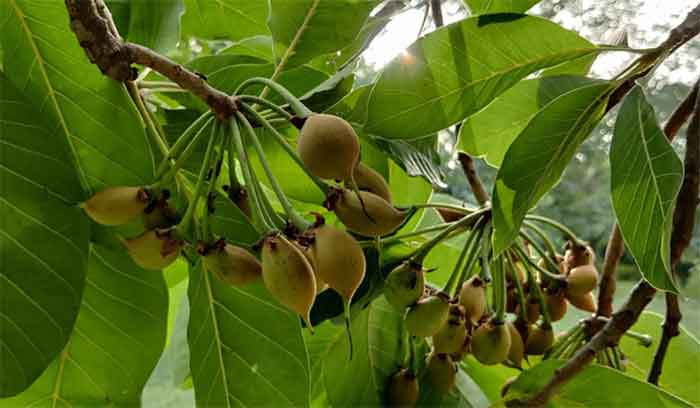
Recent government policy has resorted to huge promotion of exotic palm oil trees to end edible oil shortage in the country. However this is associated with highly disruptive ecological costs, as has been seen from the experience of several countries. The kind of high rainfall conditions needed for its high yield are not readily available in India and this will lead to heavy extraction of already scarce groundwater. Plans of its large scale introduction in ecologically fragile regions have already faced much criticism.
A much better option would be to explore the potential of several indigenous trees which yield oilseeds from which edible oil can be obtained.
There are several such indigenous trees which can provide edible oils, such as mahua, karanj, sal, kokum, kusum etc. (not to mention coconut, which is already well established as a supplier of edible oil). Some of these trees are known and some are not so well-known and need to be explored further. The edible oil contained from some of these trees is known to be very good for nutrition and to be rich in poly unsaturated fats, important for nutrition.
Availability of edible oils can increase significantly even from already existing trees. However once this importance is realized and conscious efforts are made to increase these trees, then edible oil availability for domestic use ( particularly in tribal community areas) as well as for export markets for niche uses, including medicinal value, can increase even more significantly.
However it will be a mistake to grow these trees as plantation crops. This will be harmful for biodiversity, environment and food security. It will be much better for all families in a tribal community to grow two additional such trees each on their land. In this way about two to four hundred additional oilseed trees can grow in each village, and about 200,000 villages in India are likely to be suitable for growing these trees.
As almost all of these trees have multiple uses for their fruits, flowers, seeds, leaves etc., benefits for these farmers and villagers will be many. Mahua tree can provide very nutritious and filling food which is all the more useful in lean season and drought years, its fodder is also very useful while at the same time the use of its flower as an intoxicant should be minimized.
Cooperatives of farmers and villagers to collect tree oilseeds can be set up to ensure a fair price. However instead of selling these to big processors, value addition can be obtained by local processing.
Local processing units in all these villages should be set up, particularly to extract oil but also to process other produce of these trees. This local processing will generate more livelihoods, while the residue (after oil extraction) will provide nutritive feed for animals and organic fertilizer for farms.
The potential for this is the highest in tribal communities, but certainly potential exists in other villages also for various communities.
Isn’t it irrational that the authorities are ignoring this potential but instead going in for the ecologically disruptive option of palm oil plantation?
There are also trees like neem whose oil may not be used for cooking but has important medicinal uses. Then there are other trees which provide non-edible oil with several uses such as for soap making and can be used for cottage scale units of soap or other products of everyday use.
In addition there is much potential for better protection and improvement of coconut trees which have so many different uses apart from providing edible oils.
There is a strong case for giving much more attention to all indigenous trees which provide edible oils and for providing many more sustainable livelihoods on the basis of their various products including oilseeds, with the added caution that these indigenous trees should be grown not as big monoculture plantations but instead in their usual natural way co-existing with all biodiversity.
Bharat Dogra is Honorary Convener, Campaign to Save Earth Now. His recent books include India’s Quest for Sustainable Farming and Healthy Food, Man over Machine and Planet in Peril.










































